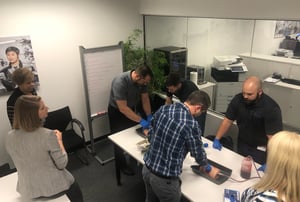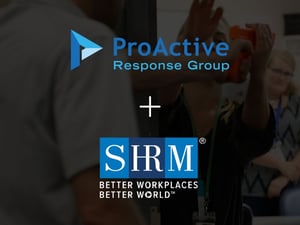Wash your hands, wear your mask, 6 feet apart, just a few phrases that are now ingrained in our heads. You don't even think about these things anymore, you just do them. Now let's imagine an industrial accident at your plant. An employee has their arm stuck in a machine and is bleeding profusely, or a car accident where your loved one has arterial bleeding coming from their shoulder. Time is not on your side, and you are sitting there trying to remember what you learned 2-3 years prior in your bleeding control breakout session of class.
You see, there is a reason why seasoned airline passengers sit down, buckle their seat belts, put their tray tables up and stow their items under the seat in front of them. Day after day, they hear the flight attendant say the same 3-minute speech, so it becomes muscle memory. Did you know the average human only hears about 20% of what someone says to them? You may be asking where we're going with this. Well, it's quite simple, it's the importance of refresher training.
Regular refresher training helps individuals remember important but seldom-used information. Many times refresher courses reveal knowledge gaps and training needs within the organization. It's like learning a foreign language. If you don't use it, you lose it. When we look at Active Shooter Events, we must remind ourselves of the time gap between the actual violence and medical personal arriving on the scene. Studies show that the average response time for EMS in these events could be much longer than the 3-5 minute window an individual has to bleed out.
Skills such as tourniquet application, wound packing, chest seals; where and when to use them is a skill that must always be refreshed. Our goal is to build muscle memory and provide refresher trainings that continually review and practice these skills.
Our Blog: Equipping & Empowering
Andy Sexton

Recent Posts
How do you know when it's time for a refresher training?
Topics: Company News
There are two types of people in a crisis — those who act and those who do not.
At ProActive Response Group, we talk a lot about having survivor's mindset. It's an important part of our training because in order to survive a violent encounter, you must first have the will to survive.
In today's blog article we want to dive a little deeper into this idea of a survivor's mentality by uncovering the five characteristics that are true of a survivor.
4 Things That Could Save Your Life in an Active Shooter Situation
Surviving an active shooter event doesn't have to be based on chance or luck. Survival can be trained, and with the right skills and proactive steps in your back pocket, you can be prepared for something as unpredictable as an active shooter event.
Let's discuss four key pieces of knowledge that really could save your life in an active shooter situation.
Topics: Company News
ProActive Response Group Approved as SHRM Recertification Provider
PRESS RELEASE
Greenville, SC January 24, 2020 – ProActive Response Group, a Greenville-based business that provides Active Shooter Response Training to schools, companies, religious establishments, and industrial facilities across the U.S. has been approved as a SHRM Recertification Provider.
As a SHRM Recertification General Provider, ProActive Response Group can award SHRM Professional Development Credits (PDCs) to HR professionals who complete their Active Shooter Response Training. The training is valid for up to 4 credits for the SHRM-CP® or SHRM-SCP®.
Topics: Company News
How to Address the Aftermath of a Workplace Violence Incident
It's amazing how quickly a story of a workplace violence incident will go in and out of the news. From the perspective of an outside party reading the news or tuning in, active shooter events seem to be forgotten almost as quickly as they happen.
The thing is, there's a lot of aftermath a company deals with that the news doesn't cover. In order for a business, corporation or other organization to recover from a traumatic workplace violence incident, there must be an intentional plan or procedure for dealing with the aftermath.
Let's look at the steps companies should be taking in order to properly handle the aftermath of an active shooter event.
For some organizations, such as South Carolina Public Schools, Active Shooter Training Drills are mandatory. They're a task on a to-do list and essentially a box that every school administrator is relieved to check off.
Depending on what company you work for, Active Shooter Response Training may be mandatory as well. Many organizations are now requiring on-site training, video training, or some form of blended learning for their entire workforce.
It's not a small task. In both scope and importance, Active Shooter Training is a major undertaking. So, how can you be sure you're doing it right? In other words, how do you provide training that's not forgotten as quickly as it's taught?
In this article, we'll point out training strategies that make an Active Shooter Training course successful, but first, we'll start by identifying some of the mistakes that could be undermining the training you're offering your team.
Topics: Corporations, Schools, Industrial Facilities, Places of Worship
Preventing Workplace Violence: Office Security Is Not the Same as Training
A lot of employers are trying figure out if advanced security is an effective way to protect their employees from workplace violence. Putting your entire workforce through an active shooter response training course seems a little too intense. It's not something employers want to even think about, much less ask their employees to participate in.
Security precautions seem like a much less invasive solution that would accomplish the same purpose: to keep violence out of your workplace. However, there is a difference between making your workplace secure, and training your workplace for safety. Simply put...
- Security reduces risk of emergency.
- Training responds in an emergency.
All of the security guards, metal detectors, outdoor cameras, and key codes for building entrances cannot beat the effectiveness of first response training. Why? Because security measures ward off potentially violent encounters, but if and when security is breached, your company needs a trained response plan.
Topics: Corporations
How Do I Make My School's Active Shooter Drill a Positive Experience?
If you work for a school in the state of South Carolina, or you have a child who attends one, you are probably well aware of the law that was passed last year, requiring all public schools to hold two active shooter drills per year.
Doing the drill is not up for debate, but every public school has some flexibility in the approach it chooses to take in fulfilling the requirement. This flexibility is meant to ensure that every school selects an active shooter training program that best meets its unique needs, but for school principals and other decision makers, that's a lot of responsibility to take on.
What if the drill isn't helpful? What if it scares students and staff? What if it's an absolute mess? What if...
Topics: Schools
How should I respond to injuries if I encounter a car accident?
Many people go through their entire lives and never have to provide emergency medical treatment to save someone's life. But what if tomorrow you're driving home from the grocery store or to your son's soccer game, and you witness a serious car accident?
Obviously, you call 911, check to see the severity of injuries or if everyone is okay.
But what else do you do if they're not? In this situation, you're the first responder; what can you do to help until EMTs arrive?
Should Children's Medical Injuries Be Treated Differently Than Adults?
It’s one thing to put a tourniquet on a 195-pound adult – it’s quite another to put a tourniquet on a child.
Or is it?
Many people are terrified by the thought of treating a child or an infant suffering from severe bleeding or another life-threatening injury, but for anyone who ever finds themselves in that situation, a few moments of hesitation could reduce a child’s chances of survival.
Topics: Schools, Places of Worship, General Prevention & Response Tips
.png?width=499&height=133&name=Logo-menu%20(1).png)











